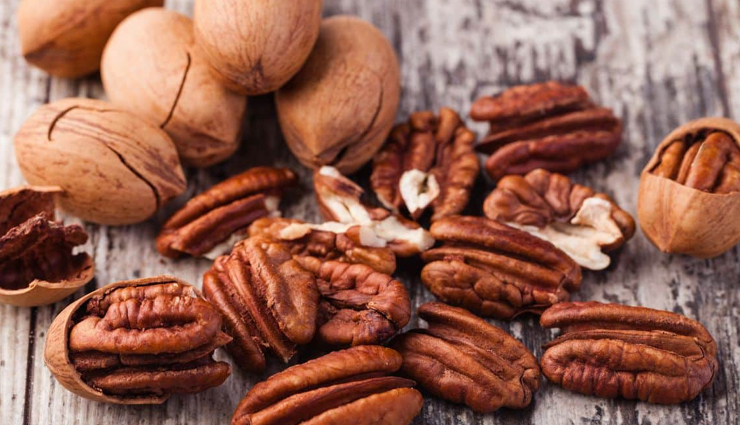- Home›
- Healthy Living›
- 13 Health Benefits Of Pecan Nuts
13 Health Benefits Of Pecan Nuts
By: Priyanka Maheshwari Thu, 03 Aug 2023 3:09:01

Nature's treasures often come in small packages, and pecan nuts are no exception. Bursting with flavor and nutritional richness, pecans have rightfully earned their place among the superfoods celebrated for their remarkable health benefits. These delectable nuts, originating from the majestic pecan tree, have been cherished by cultures across the globe for centuries. With a taste that marries buttery sweetness and a satisfying crunch, pecan nuts offer more than just culinary delight – they are a powerhouse of essential nutrients and wellness-enhancing properties. In this exploration of 13 Health Benefits of Pecan Nuts, we uncover the impressive array of advantages these nuts bestow upon those who make them a part of their diet. From heart health and antioxidant prowess to bone strength and cognitive support, let us embark on a journey through the remarkable world of pecan nuts and discover the myriad ways they contribute to a healthier and more vibrant life.
What are Pecan Nuts?
Pecan nuts, often simply referred to as pecans, are edible nuts derived from the pecan tree (Carya illinoinensis), a species native to North America. These nuts are renowned for their rich, buttery flavor and are commonly used in both sweet and savory dishes. Pecan trees are primarily grown in the southern United States and Mexico, although they are also cultivated in other parts of the world.
Pecan nuts are encased in a hard shell that needs to be cracked open to access the edible kernel inside. The kernels, or "meat," of pecans are the part that is consumed and enjoyed. Pecans are popular as a snack, added to baked goods like pies, cookies, and muffins, and used to enhance the texture and flavor of salads, cereals, and various dishes.
These nuts are not only delicious but also nutritionally dense. Pecans are a good source of healthy fats, particularly monounsaturated fats, which are beneficial for heart health. They are also rich in dietary fiber, providing both soluble and insoluble fibers that support digestive health. Pecans are packed with essential vitamins and minerals, including vitamin E, manganese, zinc, and magnesium. Additionally, they offer antioxidants and other bioactive compounds that contribute to their potential health benefits.
Pecan nuts are not only enjoyed for their culinary versatility but also recognized for their potential role in promoting overall wellness. Their unique flavor profile and nutritional composition make them a sought-after ingredient in a wide range of dishes, making them a staple in many kitchens around the world.
Health Benefits of Pecan Nuts

# Heart Health
Pecans Nuts offer notable benefits for heart health due to their rich nutritional profile. Their abundance of monounsaturated fats, antioxidants like vitamin E, and dietary fiber contribute to reducing bad cholesterol levels (LDL) and increasing good cholesterol levels (HDL). These heart-healthy attributes aid in lowering the risk of heart disease. Pecans also contain essential minerals such as potassium, magnesium, and calcium, which help regulate blood pressure and support heart function. Their anti-inflammatory properties, ability to stabilize blood sugar levels, and promotion of nitric oxide production for improved blood flow further enhance their positive impact on cardiovascular well-being.

# Antioxidant Properties
Pecans Nuts are a rich source of antioxidants, including vitamin E, ellagic acid, flavonoids, tannins, and manganese. These antioxidants work together to combat oxidative stress and protect cells from damage caused by free radicals. Consuming pecans regularly can contribute to improved overall health by reducing inflammation, supporting heart health, and reducing the risk of chronic diseases. Including pecans in your diet as a snack or part of meals is a delicious way to harness their antioxidant properties and promote well-being.

# Weight Management
Pecans Nuts can aid in weight management due to their satiating properties, healthy fats, and dietary fiber. Their nutrient density provides a satisfying boost of nutrition without excessive calories. Pecans help control hunger, stabilize blood sugar levels, and promote mindful snacking. However, moderation is key, and incorporating pecans into a balanced diet can contribute to successful and sustainable weight management.

# Brain Health
Pecans Nuts are beneficial for brain health due to their rich nutritional profile. They contain omega-3 fatty acids, vitamin E, and antioxidants, which support brain function and protect against oxidative damage. Pecans may have neuroprotective effects, improve blood flow to the brain, and contribute to better memory and cognitive performance. The B vitamins in pecans also play roles in brain health. Including pecans in a balanced diet can nourish the brain and potentially enhance mood and emotional well-being.

# Bone Health
Pecan nuts provide calcium, magnesium, phosphorus, protein, and vitamin E, all of which play vital roles in maintaining strong and healthy bones. These nutrients support bone density, formation, and repair, reducing the risk of bone-related issues like osteoporosis. Pecans' healthy fats also possess anti-inflammatory properties that can positively impact bone health. However, a well-balanced diet, including other calcium-rich foods and regular physical activity, is essential for optimal bone health.

# Digestive Health
Pecan nuts are beneficial for digestive health due to their dietary fiber content, which promotes regular bowel movements and supports gut health. The prebiotic effects of pecans encourage the growth of beneficial gut bacteria, contributing to a healthy gut microbiome. Pecans' digestive enzymes aid in efficient food digestion and nutrient absorption. The anti-inflammatory properties of pecans can reduce inflammation in the digestive tract, benefiting individuals with conditions like irritable bowel syndrome (IBS). The mineral and B vitamin content in pecans also support digestive function. As part of a balanced diet, consuming pecans in moderation can be a delicious way to promote digestive health and overall well-being. Individuals with specific digestive conditions or nut allergies should seek professional advice before including pecans in their diet.

# Blood Sugar Regulation
With a low glycemic index and rich in healthy fats, fiber, magnesium, and antioxidants, pecans help stabilize blood sugar levels and improve insulin sensitivity. The fiber content slows sugar absorption, preventing sudden spikes in blood sugar after meals. Additionally, pecans can aid in weight management, further supporting blood sugar control. However, individuals with diabetes should monitor their pecan intake and seek guidance from healthcare professionals for personalized advice on managing blood sugar levels

# Anti-Inflammatory Properties
Pecan nuts possess anti-inflammatory properties due to their rich content of antioxidants, polyphenols, monounsaturated fats, magnesium, gamma-tocopherol, and phytosterols. These compounds work together to combat oxidative stress and reduce inflammation in the body. Incorporating pecans into the diet can contribute to overall health by mitigating chronic inflammation, which is linked to various diseases.

# Skin Health
Pecan nuts offer multiple benefits for skin health. Their rich antioxidant content, including vitamin E and phenolic compounds, helps protect skin cells from oxidative stress and premature aging. Pecans' nutrients, such as zinc, manganese, and B vitamins, support collagen production, maintaining skin elasticity and firmness. The healthy fats in pecans moisturize the skin and prevent moisture loss. Additionally, their anti-inflammatory properties may help soothe skin inflammation and redness. While pecans contribute to healthy skin, a comprehensive skincare routine, hydration, sun protection, and a balanced lifestyle are also essential for maintaining radiant skin.

# Eye Health
Pecan nuts rich in vitamin E, which protects eye cells from oxidative damage, and zinc, which maintains the health of the retina. Pecans also contain lutein and zeaxanthin, carotenoids that protect the eyes from harmful light and reduce the risk of macular degeneration. Additionally, omega-3 fatty acids in pecans contribute to eye health and reduce the risk of dry eye syndrome. Including pecans in a balanced diet can be beneficial for maintaining good eye health and supporting vision, but a comprehensive eye care routine and regular check-ups are also essential for optimal eye health.

# Energy Booster
Pecan nuts support the immune system through their rich content of vitamin E, zinc, antioxidants, protein, magnesium, and B vitamins. These nutrients help strengthen immune function, protect immune cells from damage, and regulate immune responses. Incorporating pecans into a balanced diet can boost the body's ability to fight infections and maintain overall health. However, a comprehensive approach to immune health, including a healthy lifestyle, exercise, sleep, and stress management, is essential.

# Blood Pressure Regulation
Pecan nuts support blood pressure regulation due to their potassium and magnesium content, which promote healthy blood vessel function and counteract the effects of sodium. Their healthy fats, antioxidants, and fiber contribute to improved cardiovascular health and indirectly help lower blood pressure levels. Including pecans as part of a balanced diet, along with other heart-healthy practices, can aid in maintaining healthy blood pressure.
Side Effects of Pecan Nuts
Allergies: Pecans are tree nuts, and individuals with tree nut allergies may experience allergic reactions when consuming pecans. Symptoms can range from mild itching or hives to severe reactions like difficulty breathing and anaphylaxis. Anyone with nut allergies should avoid pecans and related products.
Caloric Content: Pecans are calorie-dense due to their healthy fat content. Overconsumption can lead to excessive calorie intake, potentially contributing to weight gain. Portion control is important, especially if you are trying to manage your weight.
Omega-6 Fatty Acids: Pecans, like many nuts, contain omega-6 fatty acids. While these fats are essential for health, an imbalance between omega-6 and omega-3 fatty acids in the diet may have inflammatory effects. Maintaining a balanced intake of these fatty acids is crucial for overall health.
Digestive Issues: Some individuals may experience digestive discomfort, such as bloating or gas, when consuming nuts, including pecans. Chewing nuts thoroughly and drinking enough water can help mitigate these effects.
FODMAP Sensitivity: Pecans contain certain types of carbohydrates called FODMAPs (fermentable oligosaccharides, disaccharides, monosaccharides, and polyols) that can trigger symptoms in individuals with irritable bowel syndrome (IBS) or FODMAP sensitivity.
Oxalates: Pecans, like many plant foods, contain oxalates, which can contribute to kidney stone formation in susceptible individuals. People with a history of kidney stones may need to limit their oxalate intake.
Cadmium Content: Nuts, including pecans, can absorb cadmium from the soil. Long-term exposure to high levels of cadmium may have adverse effects on health, especially kidney function. Eating a variety of foods and choosing nuts from reputable sources can help mitigate cadmium exposure.





